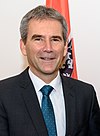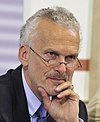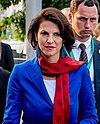First Kurz government
| First Kurz government | |
|---|---|
Cabinet of Austria | |
| 2017 | |
 | |
| Date formed | 18 December 2017 |
| Date dissolved | 3 June 2019 |
| People and organisations | |
| Appointed by | Alexander Van der Bellen |
| Chancellor | Sebastian Kurz (2017–19) Hartwig Löger (acting; 2019) |
| Vice-Chancellor | Heinz-Christian Strache (2017–19) Hartwig Löger (2019) |
| Member parties | People's Party Freedom Party (2017–19) |
| Status in legislature | Majority coalition (2017–19) Semi-technocratic minority cabinet (2019) |
| No. of ministers | 13 |
| Opposition parties | Social Democratic Party Freedom Party (2019–present) NEOS JETZT |
| Opposition leader | Christian Kern (SPÖ) (2017-2018) Pamela Rendi-Wagner (SPÖ) (2018-2019) |
| History | |
| Election(s) | 2017 legislative election |
| Predecessor | Kern government |
| Successor | Bierlein government |
The First Kurz government (German: Erste Bundesregierung Kurz) was the national government of Austria in office from 18 December 2017 until 3 June 2019. It succeeded the Kern government, following the 2017 election. Sebastian Kurz, leader of the centre-right ÖVP, reached an agreement on a coalition with the far-right FPÖ, making him chancellor of Austria. The cabinet was appointed by President Alexander Van der Bellen.[1]
In the wake of the May 2019 Ibiza affair, Kurz tore up the coalition agreement and called for a snap election, which was ultimately held on Sunday, 29 September 2019, after some disagreements over the timing. Kurz announced that his government would run as a minority technocratic caretaker government until the election.[2] However, on 27 May 2019, his government was dismissed by the National Council through a motion of no confidence, the first successful parliamentary vote of no confidence in the Second Republic.[3] On 3 June 2019, Federal President Alexander Van der Bellen swore in an interim technocratic government led by Brigitte Bierlein, who is due to hold office until the formation of a new government following the September 2019 parliamentary election.
Composition
Actions
See also
References
- ^ "Kurz Set to Become Austrian Chancellor, Backed by Nationalists". Bloomberg. 18 December 2017. Retrieved 18 December 2017.
- ^ "Austria's Kurz Turns to Technocrat Cabinet as Populists Ousted". Bloomberg. 20 May 2019. Retrieved 21 May 2019.
- ^ "Kabinett Kurz verliert Misstrauensabstimmung". orf.at (in German). Retrieved 27 May 2019.
















